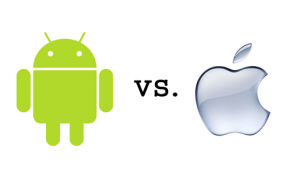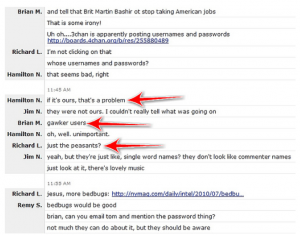
(crossposted from MobileLocalSocial)
Before you tear me apart for a sensationalist title, let me explain.
I do not think that Gawker Media, the multimillion dollar blogging corporation, will fall. As a general rule, I do not second-guess the business strategies of multi-million dollar companies. However, the bloom is definitely off the rose as far as Gawker’s standing in the public eye is concerned.
Fair disclosure: For over four years, I have been a commenter on Gawker blogs, most notably on Gizmodo.
I remember when Gizmodo pranked CES. Which was a pretty bad thing considering that the prank consisted of a Gizmodo blogger screwing with companies’ presentations at a trade show. The videographer responsible was not fired and still works quite happily under Gawker’s main imprint.
This year, as with every year, Gawker blogs have found themselves in hot water for their practices. Gawker itself received a takedown notice and the rather disingenuous ire of Facebook celebrity, reality tv show host, and author Sarah Palin for printed large excerpts of one of her books. But the Gawker story that really took the cake was “iPhone4gate,” in which Gawker/Gizmodo paid $5,000 for a working prototype of the iPhone 4, destroyed it through disassembly, and then wrote about it at length, before sending it back to Apple, Inc. Whether this was legal I will not opine.
I do think that it was not a major departure from established journalism practices. Gawker’s bounties for tips and the like are well known and, frankly, paying $5,000 for the iPhone 4 is no different than paying $5,000 to a paparazzo for naked photos of Insert Hollywood Starlet Of Little To Middling Talent. It was a major development for Gizmodo and got Jason Chen’s face on many news segments.
It also marked a turning point for Gizmodo’s writing and authorship in my opinion as a blog historian of Gizmodo. For a goodly amount of time, Gizmodo had been a tech news site in the “traditional” sense of the word. It featured specs, photos, tear-downs and reviews of upcoming consumer electronics. It favored the big companies – Apple, Microsoft, Google, Motorola, etc. – but it still had a lot of bleeding edge information about the tech world. To read it today, one would not recognize it.
Last month, Joel Johnson, whose personality tends to raise hackles with the readership, wrote an entire post telling the commentariat in no uncertain terms that they could go to hell (actually, his language was far more harsh than that). Again, fair disclosure: I am not a fan of Mr. Johnson, or his pretentious writing which, frankly comes across as preening, and was banned for openly criticizing him. Since then, I tend not to comment on Gizmodo. Several weeks later, Mr. Johnson had angered some other readers and some hacking was their retaliation. Mr. Johnson’s response was to tell commenters to all f**k off. It was petulant, counterproductive, and off-putting.
At present, there is an article about a wooden roller coaster someone built in their backyard. There’s a posting about a YouTube video shot by putting a camera around a cat’s neck. There’s a story about a girl who got trapped in an arcade claw machine. There’s a YouTube video about multiplication tables in Japan. In contrast, Engadget (Gizmodo’s main competitor) has stories about a 100-disc Blu-Ray changer, a useful hack for a portable WiMAX device, Kindle sales data, several upcoming Android handsets, and stories about tablet computers not called the iPad and about patent cases and Senate legislation about technology.
In short, Gizmodo is now US Weekly to Engadget’s Economist. The Economist has better writing and better serves its readers but US Weekly sells more because it just goes for the low-hanging fruit.
Putting this in perspective, this last week really brought to the fore how the sea change is a real thing and not the product of selective perception. Last week, Google announced the Chrome laptop. Engadget liveblogged the event with a dizzying gallery of photos and ample coverage of all the details. Gizmodo didn’t even attend. Instead, they posted about an ice hotel decked out like Tron and then wrote about the laptop later on.
Finally, capping out the fiasco was a massive security breach of Gawker’s servers in which all accounts – user, editor, and commenter – were compromised. The hackers gained access to thousands upon thousands of passwords. My password was on the list compromised but hackers were not able to decipher the password (which has since been changed). Gawker had known about the flaws in its securities for months. In one internal chat exchange, Hamilton Nolan remarked about the hacking of accounts, saying if it was editor accounts, “that’s a problem”, if just the commenters, then it was “unimportant.” This was reported far and wide. NPR mentioned the hacking of Gawker accounts on its “Morning Edition” program. Additionally, Forbes magazine wrote a lengthy detailed piece on its blog, including a screencap of the chat in which Mr. Nolan called the breach of commenter accounts “unimportant.”
For their part, Gawker sites are now having to cover themselves as a story. Several have had to try to assure readers that they aren’t considered “peasants” by the editors. While I’m sure that Jason Chen and Kat Hannaford don’t consider the commentariat to be peasants, as someone who was banned by a Gizmodo editor (notorious blowhard Joel Johnson) for disagreeing with him, rote assurances don’t ring true with me. UPDATE: I WAS BANNED FROM GIZMODO FOR POSTING A REMINDER THAT JOEL JOHNSON WROTE AN ENTIRE FEATURE DEVOTED TO INSULTING THE COMMENTERS.
In the meantime, Gawker sites are to launch a massive redesign next month. This may be too little too late. As it is, the software code is on the internet to be compromised, the site itself at present loads somewhat slowly because of all of the scripts embedded in it, and the content, quite frankly, is fairly piss poor. If the new Gawker empire to be feature the crown jewel of Gizmodo writing more three-sentence stories about jackasses riding skis while being towed behind a truck (another story Gizmodo ran instead of covering the Google Chrome event), then it will lose its title as a place to go for tech news.
And that’s where Gawker stands: as a blog network that is vicious, vindictive, and populated by people who, at best, scoff at their readership and, at worst, are openly hostile to them.
As one who used to post between ten and twenty comments a day on Gizmodo, I cannot say that I will continue to comment on Gizmodo (or Gawker) in the future. There’s not much to say about a two-sentence story about Android-themed wedding cakes.
Love, luck, and lollipops,
OMG! Ponies!



